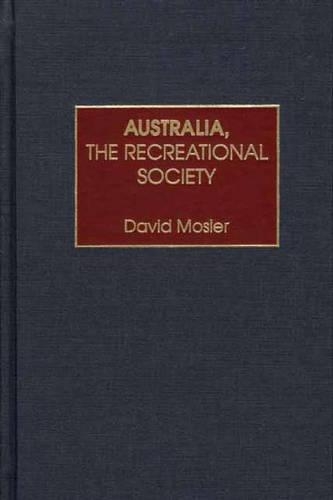
Australia, the Recreational Society
(Hardback)
Publishing Details
Australia, the Recreational Society
By (Author) David Mosler
Bloomsbury Publishing PLC
Praeger Publishers Inc
30th January 2002
United States
Classifications
Tertiary Education
Non Fiction
Cultural studies
320.994
Physical Properties
Hardback
208
Description
From its very inception Australia has been a derivative society: First as part of the British Empire and then, soon after World War II, what Mosler considers the American Empire and the new end-of-century Americanized global culture. This has meant that Australia has struggled to attain its own identity. Mosler explores that struggle for national independence, a struggle that seems to be doomed to failure. According to Mosler, the reasons for this failure lie in Australia's propensity ot remain a recreational culture; a culture more attuned to pleasure and dependence than regimented hard work and the concomitant collective pattern of national assertiveness. The Australian economy, defense arrangements, culture, and psychology have been dominated by other nations and transnational forces. The prospects for the nation in the future appear to be somewhat grim unless this historical pattern of dependence and lack of respect, indeed almost contempt, for national Institutions is reversed. A provocative analysis that will be of interest to scholars, students, researchers, and anyone interested in Australian history and contemporary life and culture.
Reviews
Mosler (economics, Univ. of Adelaide), an American who has lived in Australia for 30 years, believes that his adopted country's dedication to pleasure and hedonism has resulted in "a propensity to political and cultural adolescence," to "a kind of anti-nationalism," clearly demonstrated in the defeat of the Republic Referendum in 1999. Aussies are united only by their devotion to leisure time, sports, gambling, "barbies," drinking, and lighthearted socializing. They do not know their history; "to care about it is to be un-Australian." "Australia Day," not even celebrated on the same date throughout the country, provides "just another excuse for having a bit of fun." Anti-intellectualism is pervasive; schools and universities are underfunded and badly administered. Serious study is avoided by endless excursions--"learning experiences"--which are actually programmed student fun activities. The system has made it "impossible to train the next generation of a governing elite." Mosler thinks "a country held together with recreational glue alone just might implode." As a nation, Australia might be "a lemon, a nonstarter." He argues that "without a sense of national purpose its best future option is to become the fifty-first state of America." An interesting, indeed fascinating, well-documented volume. All levels and collections.-CHOICE
"Mosler (economics, Univ. of Adelaide), an American who has lived in Australia for 30 years, believes that his adopted country's dedication to pleasure and hedonism has resulted in "a propensity to political and cultural adolescence," to "a kind of anti-nationalism," clearly demonstrated in the defeat of the Republic Referendum in 1999. Aussies are united only by their devotion to leisure time, sports, gambling, "barbies," drinking, and lighthearted socializing. They do not know their history; "to care about it is to be un-Australian." "Australia Day," not even celebrated on the same date throughout the country, provides "just another excuse for having a bit of fun." Anti-intellectualism is pervasive; schools and universities are underfunded and badly administered. Serious study is avoided by endless excursions--"learning experiences"--which are actually programmed student fun activities. The system has made it "impossible to train the next generation of a governing elite." Mosler thinks "a country held together with recreational glue alone just might implode." As a nation, Australia might be "a lemon, a nonstarter." He argues that "without a sense of national purpose its best future option is to become the fifty-first state of America." An interesting, indeed fascinating, well-documented volume. All levels and collections."-CHOICE
Author Bio
DAVID MOSLER is Senior Lecturer in American History at the University of Adelaide. His most recent book, co-authored with Bob Catley, was Global America: Imposing Liberalism on a Recalcitrant World (Praeger, 2000).
